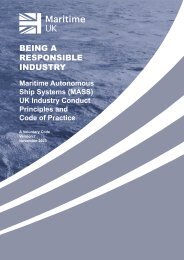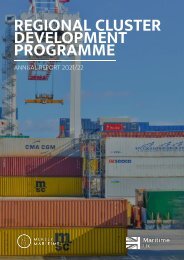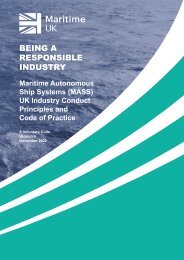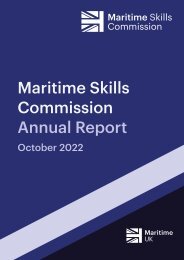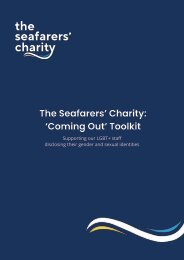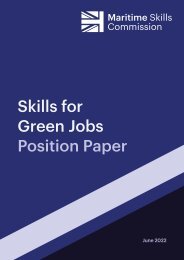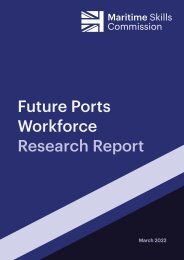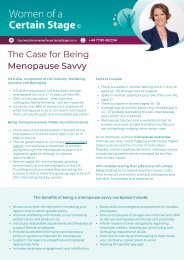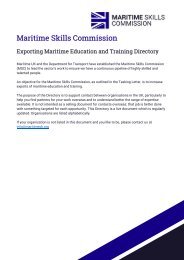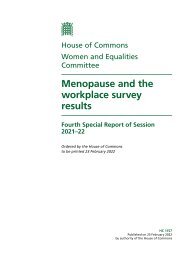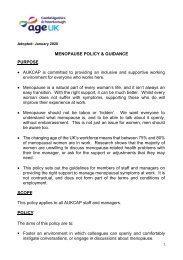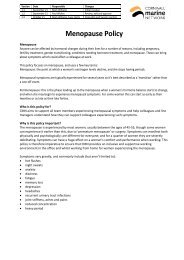code_of_practice_V3_2019
You also want an ePaper? Increase the reach of your titles
YUMPU automatically turns print PDFs into web optimized ePapers that Google loves.
Definitions for Level <strong>of</strong> Control (LoC) are shown at Table 1-4 and should be considered alongside the Degrees <strong>of</strong><br />
Autonomy Table 1-2. In <strong>practice</strong>, levels <strong>of</strong> control may be different for different functions aboard the same MASS (e.g. a<br />
MASS navigating under LoC4, may also deploy a payload that is controlled at LoC2). The LoC applied to the MASS<br />
may also change during a voyage (e.g. LoC 1 in a VTS, but LoC 4 in open ocean passage).<br />
“Master” is defined in s.313 <strong>of</strong> the Merchant Shipping Act 1995 as the individual in "command or charge <strong>of</strong> a ship". For<br />
the purposes <strong>of</strong> this Code, the term “master” should mean a specific person <strong>of</strong>ficially designated by the owner <strong>of</strong> the<br />
MASS as discharging the responsibilities <strong>of</strong> the Master <strong>of</strong> the MASS. This will be an employee <strong>of</strong> the company who has<br />
been assessed as competent to discharge these responsibilities in accordance with the provisions <strong>of</strong> this Code. This<br />
person may be located anywhere provided that the required level <strong>of</strong> command, control and communication can be<br />
maintained to discharge these duties.<br />
“MASS” – Maritime Autonomous Surface Ship. A term adopted by the IMO for their scoping exercise which means, for<br />
the purpose <strong>of</strong> this Code, a surface ship that is capable <strong>of</strong> being operated without a human onboard in charge <strong>of</strong> that<br />
ship and for which the level <strong>of</strong> control may encompass any <strong>of</strong> those shown at Table 1-4.<br />
“MASS Watch Officer” is the individual who has responsibility for the MASS when it is operational.<br />
“Operator” – An entity (e.g. a company) that discharges the responsibilities necessary to maintain the MASS in a seaworthy<br />
condition and compliant with all relevant IMO Instruments and national legislation. The operator is also responsible for<br />
ensuring that all staff concerned with the control <strong>of</strong> MASS hold appropriate qualifications as required by IMO instruments<br />
and national legislation.<br />
“Owner” – The title holder <strong>of</strong> the MASS. If the “Company” is not the Owner, then the Owner shall report the name and<br />
details <strong>of</strong> the Operating Company to the Maritime Administration.<br />
“Recognised Organisation (RO)”. Under the provisions <strong>of</strong> SOLAS 1974/1988 regulation 1/6, MARPOL Annex 1<br />
regulation 6, MARPOL Annex II regulation 8, MARPOL Annex IV regulation 4, MARPOL Annex VI regulation 5, LLC<br />
1966/1988 article 13, TONNAGE 1969 article 7 and AFS 2001 Annex 4 regulation 1, the inspection and survey <strong>of</strong> ships<br />
shall be carried out by <strong>of</strong>ficers <strong>of</strong> the Flag State Administration in accordance with IMO’s RO Code. The Flag State<br />
Administration may, however, entrust the inspections and surveys either to surveyors nominated for the purpose or to<br />
organizations recognized by it. The IMO reference is MSC.349(92) dated 21 June 2013.<br />
“Remote Control” – Operational control <strong>of</strong> some or all ship operations or functions, at a point remote from the ship.<br />
“Remote Control Centre” (RCC) is a site <strong>of</strong>f the ship from which control <strong>of</strong> an autonomous ship can be executed. The<br />
RCC may be located either ashore or afloat and may exercise varying degrees <strong>of</strong> control as defined under “Levels <strong>of</strong><br />
Control”. An RCC may consist <strong>of</strong> more than one Control Station or Room.<br />
“Remote Monitoring” – Monitoring some or all ship operations or functions at a point remote from the ship.<br />
“Ship-owner” – One who owns or operates a ship, whether a person, a corporation or other legal entity, and any person<br />
acting on behalf <strong>of</strong> the Owner or Operator.<br />
“Ship Security Officer” – means a person accountable to the master, designated by the Company as responsible for<br />
the security <strong>of</strong> the ship, including implementation and maintenance <strong>of</strong> the ship security plan and for liaison with the<br />
company security <strong>of</strong>ficer and port facility security <strong>of</strong>ficers.<br />
“Unattended” – Used for a control position, e.g. an unattended bridge, without a crew available to operate it.<br />
“Unmanned” – This term is reserved for a ship with no crew on board. Crew does not include passengers or special<br />
personnel.<br />
MASS UK Industry Conduct Principles and Code <strong>of</strong> Practice Version 3 21




